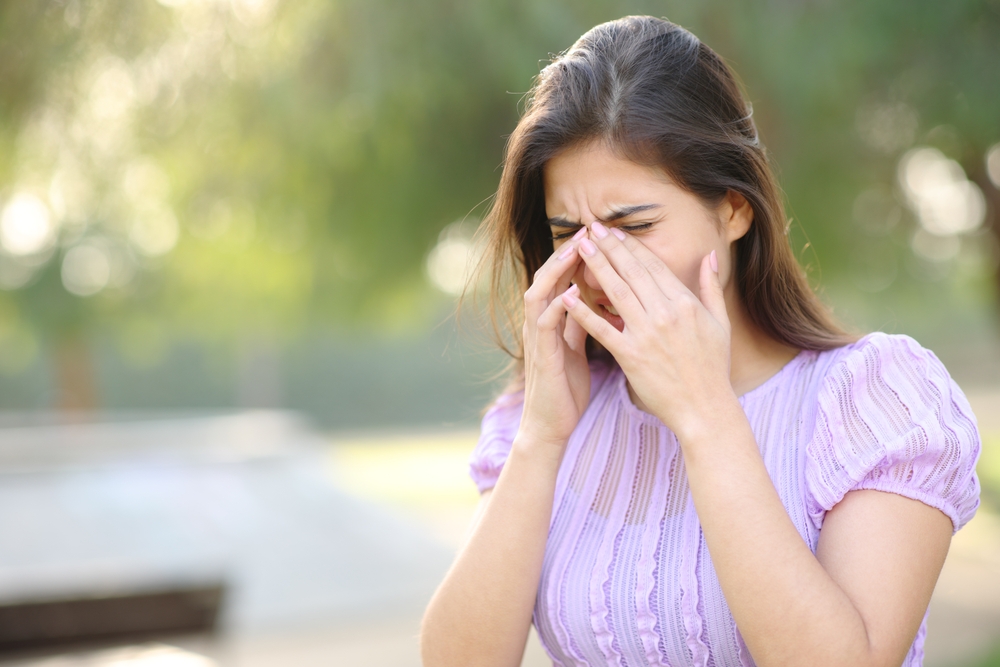Do you find yourself struggling through muggy weather, battling the discomfort of humidity? It’s not just about feeling sticky; it could also be impacting your sinus health. Sinus infections, medically known as sinusitis, can often be exacerbated by high humidity levels. Let’s delve into how humidity influences sinus infections and what steps you can take to protect yourself.
How to recognize sinus infection symptoms
Sinus infections, or sinusitis, can manifest in various ways, often causing discomfort and disruption to daily life. These infections occur when fluid accumulates in the sinuses, leading to infection, typically by viruses or bacteria.
Recognizing the symptoms is crucial for timely intervention:
- Persistent Nasal Congestion: Sinus infections often result in stubborn nasal congestion lasting for ten days or more.
- Headaches: Pressure headaches are a common symptom, signaling sinus inflammation.
- Tooth Pain: Sinus pressure can extend to the teeth, causing discomfort and pain.
- Excessive Sinus Drainage: Unrelenting sinus drainage is another indicator of infection.
- Fever: A persistent fever or high temperature may accompany sinus infections.
While not all symptoms may present simultaneously, any prolonged or severe cold-like symptoms see your primary care physician to assess the possibility of a sinus infection.
Can humidity cause sinus infections?
While sinus infections can stem from various causes, humidity plays a significant role in exacerbating the condition. Despite initial skepticism, extreme humidity can indeed contribute to sinus infections due to its impact on respiratory defense mechanisms.
- Effects on Cilia Function: Cilia, tiny hairs in the nasal passages responsible for moving mucus and filtering pathogens, are affected by humidity. In excessively humid conditions, cilia function diminishes, compromising the body’s defense against infection.
- Increased Susceptibility to Allergens: High humidity levels can lead to prolonged exposure to allergens and irritants, exacerbating sinus inflammation and fluid buildup.
What are optimal humidity levels?
Maintaining an optimal balance of humidity is essential for sinus health. While the body’s defensive mucus and cilia require adequate moisture to function effectively, excessively high humidity levels can be detrimental.
Monitoring dew points, especially when they rise into the 70s, can help individuals gauge humidity levels and take appropriate precautions.
How to lower the risk of humidity-induced sinus infections
While complete elimination of humidity-induced sinus infections may be challenging, several preventive measures can minimize the risk:
- Avoiding Allergens and Irritants: During humid weather, steering clear of known allergens and irritants can reduce sinus inflammation. Avoiding activities such as walks in wooded areas or exposure to smoke can help mitigate the risk of infection.
- Utilizing Nasal Sprays: Nasal sprays can help maintain optimal moisture levels in the nasal passages, supporting healthy cilia function and reducing susceptibility to infections.
When to see an ENT specialist
Persistent or recurrent sinus infections, particularly during humid periods, warrant consultation with an Ear, Nose, and Throat specialist. Factors such as sinus anatomy or underlying medical conditions may contribute to susceptibility to infections.
An Ear, Nose, and Throat specialist can offer personalized advice and recommend appropriate medications or interventions to promote sinus wellness.
Embracing summer without sinus infections
Summer offers abundant opportunities for outdoor enjoyment, but the threat of sinus infections shouldn’t deter individuals from relishing the season. By understanding the impact of humidity on sinus health and implementing preventive measures, individuals can safeguard against infections and fully engage in summer activities.
For those concerned about sinus health, find an Ear, Nose, and Throat specialist near you for tailored guidance for navigating humid conditions and maintaining sinus wellness.



